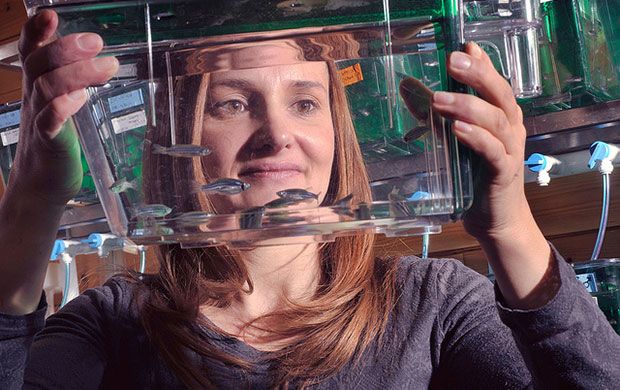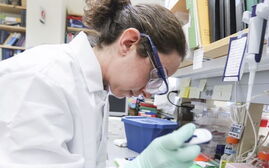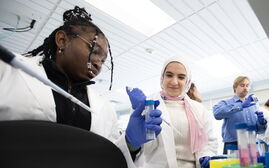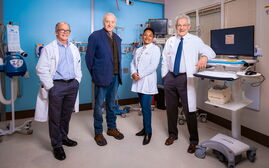Two Bar Harbor labs get separate NIH grants topping $1.67M to study nerve damage
 PHOTO COURTESY / MDI Biological Laboratory
Assistant Professor Sandra Rieger looks at at tank of zebrafish. The fish are commonly used for lab research including research to reverse peripheral nerve damage, a common side effect of chemotherapy.
PHOTO COURTESY / MDI Biological Laboratory
Assistant Professor Sandra Rieger looks at at tank of zebrafish. The fish are commonly used for lab research including research to reverse peripheral nerve damage, a common side effect of chemotherapy.
The MDI Biological Laboratory and The Jackson Laboratory both will get federal funding to study nerve damage from the National Institutes of Health’s National Institute of Neurological Disorders and Stroke.
The Jackson Lab will get $1,219,140 over four years to develop mouse models for inherited peripheral neuropathies and neurodegenerative diseases, including Charcot-Marie-Tooth disease.
MDI Biological Lab will get $456,500 over two years to support research into new drugs to potentially prevent or reverse nerve damage, a common side effect of chemotherapy.
The MDIBL grant will support ongoing work by assistant professor Sandra Rieger, who already has identified two drug candidates to potentially prevent or reverse peripheral neuropathy, as Mainebiz wrote about in February.
Up to 70% of patients undergoing chemotherapy suffer from peripheral neuropathy. Some 650,000 Americans receive outpatient chemotherapy yearly, according to the U.S Centers for Disease Control. Peripheral neuropathy is a disabling condition that causes pain, numbness, tingling and temperature sensitivity in the more distant parts of limbs or other body parts. No treatments currently exist.
Rieger is conducting her work in the zebrafish, an animal commonly used for lab research. The research also may be applicable to other sensory damage, such as those caused by diabetes or treatment with antibiotics.
The money will be used in part to see if the two drug candidates might be tested in mammals in the future. The laboratory filed a provisional patent for the drug candidates in early February.
“This grant will allow us to move closer to our goal of translating our discoveries about peripheral neuropathy in zebrafish in chemotherapy patients and to the millions of … people who live with this condition, which can seriously interfere with many everyday tasks,” Rieger said in a prepared statement.
Mouse models
The Jackson Lab will use its grant to develop mouse models for inherited nerve diseases including Charcot-Marie-Tooth disease, which the NIH said is one of the most common inherited neurological disorders, affecting about 1 in 2,500 people in the United States.
Jackson Lab Professor Robert Burgess, who studies CMT, said the lack of clinically relevant animal models is hampering the development of new treatments for peripheral neuropathies. “Thanks to new diagnostic tools, about 80 human CMT disease mutations have been identified, but most do not yet have a mouse model to investigate the disease mechanisms,” he said in a statement.
The new grant will also establish the JAX Resource for Research of Peripheral Neuropathy to help accelerate and distribute mouse models for CMT.
Read more
JAX lab lands $2.3M grant for elderly pneumonia research
Jackson Lab pulls in lots of money, but is there ever enough funding for life-saving research?
How early childhood stress could lead to costly adult illnesses














Comments